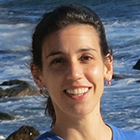Three Postdoctoral Scientists to Establish Labs at MBL as Hibbitt Early Career Fellows

Three talented postdoctoral scientists have been named the inaugural Hibbitt Early Career Fellows at the Marine Biological Laboratory (MBL), which gives them the rare opportunity to establish research programs of their own as an alternative to traditional postdoctoral positions.
Caroline Albertin, Kristen Hunter-Cevera, and B. Duygu Özpolat will receive the necessary support to work as principal investigators at the MBL, where they can tap into the MBL’s unique research environment and resources, including the collaborative Faculty of 500 network of scientists from its year-round and visiting research communities.
“This is an exceptional group of young scientists who will significantly enhance the MBL’s year-round community in strategic areas of research. We look forward to welcoming them to the campus in the coming months,” said MBL Interim Co-Director Melina Hale.

Caroline Albertin was the lead author of a 2015 Nature paper that described the first cephalopod genome (the California two-spot octopus), which attracted worldwide attention and further inspired her interest in the unusual body plans of the cephalopods (octopus, squid, and cuttlefish). At the MBL, Albertin will continue to study cephalopod development and evolution at a molecular and cellular level, with a goal of establishing the cephalopods as a compelling model system for comparative evolutionary-developmental research. Albertin will interact significantly with the MBL’s Marine Resources Center, imaging facilities, and other cephalopod-focused research groups. She comes to the MBL from the University of Chicago, where she conducted her Ph.D. research in the laboratory of neurobiologist Cliff Ragsdale.

Kristen Hunter-Cevera is interested in microbial ecosystems and how bacteria interact with and influence their surrounding environment. Ecosystems depend on the activities of bacteria, which are affected not only by environmental factors, but also by the activity of surrounding microbes. At the MBL, Hunter-Cevera will investigate how different bacteria affect the activity and abundance of an important marine cyanobacteria, Synechococcus, and how these interactions could change in varying environmental conditions. This research will provide insights into how relationships among microbes influence coastal ecosystem functions and also basic understanding into microbiome systems. Hunter-Cevera received her Ph.D. in the MIT-Woods Hole Oceanographic Institution Joint Program. She especially looks forward to taking advantage of MBL’s advanced expertise in microbial population sequencing and analysis, bioinformatics, and imaging.

Duygu Özpolat comes to the MBL from the Institut Jacques Monod in Paris. At the MBL, she will study how some invertebrates (echinoderms, such as sea urchins and sea stars, and segmented worms) are able to regenerate their reproductive organs and reproductive cells (the germline). Understanding the mechanisms of germline regeneration in these animals can illuminate fundamental issues in stem cell biology that also have clinical significance. Özpolat’s research program will be enriched, in particular, by the MBL’s Marine Resources Center and by expertise among its faculty in imaging, bioinformatics, and developmental biology. Özpolat received her Ph.D. at Tulane University and is a 2013 alumna of the MBL Embryology course.
The Hibbitt Early Career Fellows program is funded by a generous gift from Susan and David Hibbitt.
—###—
The Marine Biological Laboratory (MBL) is dedicated to scientific discovery – exploring fundamental biology, understanding marine biodiversity and the environment, and informing the human condition through research and education. Founded in Woods Hole, Massachusetts in 1888, the MBL is a private, nonprofit institution and an affiliate of the University of Chicago.